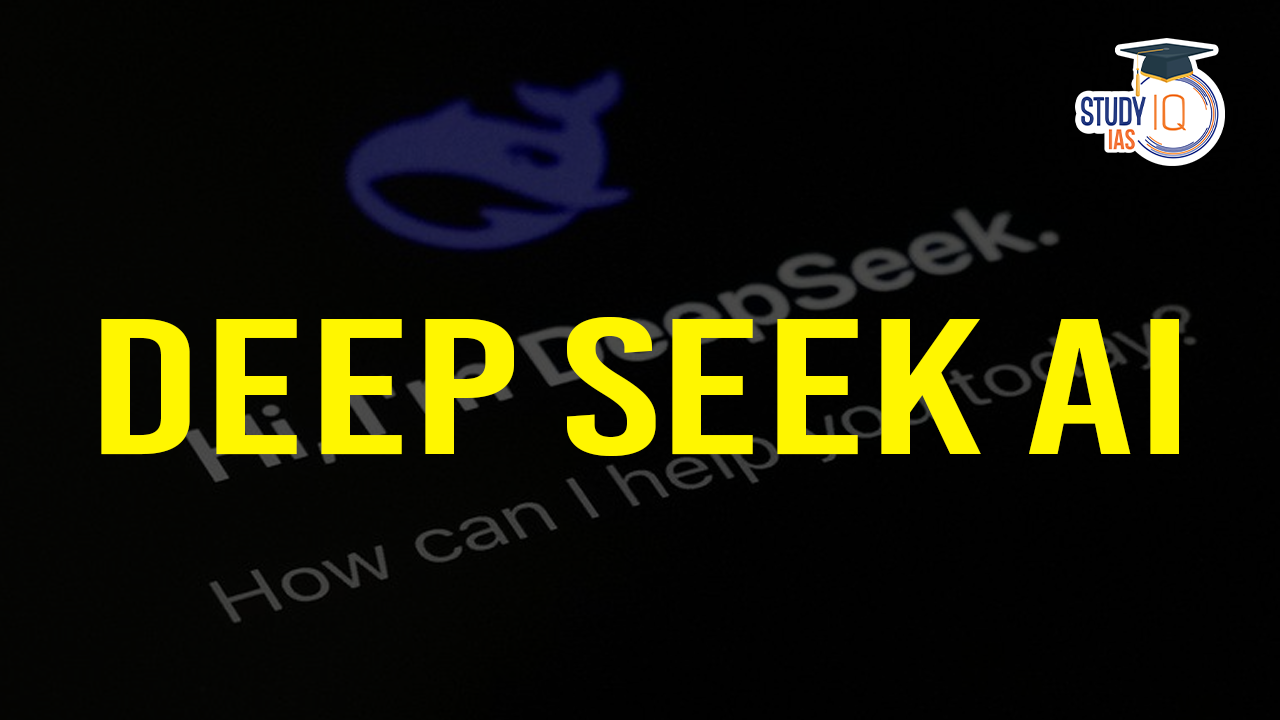Table of Contents
Context: DeepSeek, a Chinese company, has shaken up the global tech industry and stock markets with its low-cost artificial intelligence (AI) model.
About Deep Seek AI
- DeepSeek AI is a Chinese artificial intelligence startup that has quickly gained prominence as a competitor to ChatGPT.
- It was founded by Liang Wenfeng in May 2023 and became widely popular in early 2025 with the release of its DeepSeek-R1 model.
Two Powerful AI Models
- DeepSeek-V3: Focuses on general-purpose tasks like answering questions, generating content, and coding.
- DeepSeek-R1: Excels in complex reasoning, logical problem-solving, and mathematical calculations.
List of Countries Who Banned DeepSeek
Here is a list of countries that have banned or restricted DeepSeek AI due to data privacy and security concerns:
| Country | Ban Type | Reason |
|---|---|---|
| Italy | Full Ban | Privacy policy concerns |
| Taiwan | Government Ban | National security risks |
| Australia | Government Ban | Data privacy & security concerns |
| South Korea | Partial Ban | Temporary block in industry & defense ministries |
| United States | Partial Ban | Restrictions in federal agencies, Texas, and proposed nationwide ban |
Features of DeepSeek AI
Mixture-of-Experts (MoE) Architecture
- Unlike traditional AI models, MoE ensures that only a small portion of the model’s parameters are active at any time.
- This reduces computing power requirements while maintaining high efficiency.
- It also enables faster learning and improved performance over time.
Free to Use Without Limitations
- Unlike ChatGPT’s premium features, DeepSeek AI is completely free for regular users.
- No restrictions on daily usage, making it accessible to everyone.
Cost-Effective API Pricing
- DeepSeek AI offers significantly cheaper APIs compared to OpenAI’s ChatGPT, making it an attractive choice for developers.
Real-Time Web Search Capability
Users can search the web directly from DeepSeek AI to obtain real-time, updated information.
Impact of DeepSeek’s Innovation on India’s IT Dominance
Disruption of the Low-Cost IT Model
- India’s IT sector has historically thrived on an abundant supply of skilled, cost-effective labor.
- DeepSeek’s AI-driven automation reduces the need for human intervention, threatening India’s advantage in IT services.
AI Eliminating Skill and Language Barriers
- Generative AI models like DeepSeek’s can perform tasks traditionally outsourced to India, such as customer support, coding, and data analysis.
- This diminishes India’s edge in English proficiency and IT services.
India’s Lag in AI and R&D Investments
- DeepSeek’s breakthrough reflects China’s strong investment in AI and computational capabilities.
- India’s R&D expenditure remains below 1% of its GDP, far behind China’s 2.43%, impacting its ability to innovate.
Need to Move Beyond Labor-Led Growth
- Indian IT firms must shift from labor-intensive models to AI-powered solutions.
- Failing to adapt could lead to reduced global demand for India’s IT services.
Key Learnings from DeepSeek
- Prioritizing R&D as a Strategic Investment: DeepSeek’s success highlights the need for continuous AI research and innovation, even if it’s not the company’s core business. Indian IT firms must invest in long-term technological advancements.
- Utilizing Idle Capital for Innovation: Companies should channel surplus resources into AI and emerging tech research instead of solely focusing on workforce optimization.
- Encouraging Risk-Taking & Experimentation: DeepSeek treated AI as a secondary initiative yet achieved breakthrough success. Indian firms must foster a culture where experimentation and failure are seen as steps toward innovation.
- Building a Workforce that Works with AI, Not Against It: Instead of resisting AI, India must train its workforce to enhance productivity through AI tools and automation.
- Developing AI & Quantum Capabilities: India must aggressively invest in AI and quantum computing to stay competitive in the next wave of technological advancements.


 Comprehensive Remote Sensing Observation...
Comprehensive Remote Sensing Observation...
 Perovskite Solar Cells, Objective and Ch...
Perovskite Solar Cells, Objective and Ch...
 Navy-Marine Expeditionary Ship Interdict...
Navy-Marine Expeditionary Ship Interdict...





















